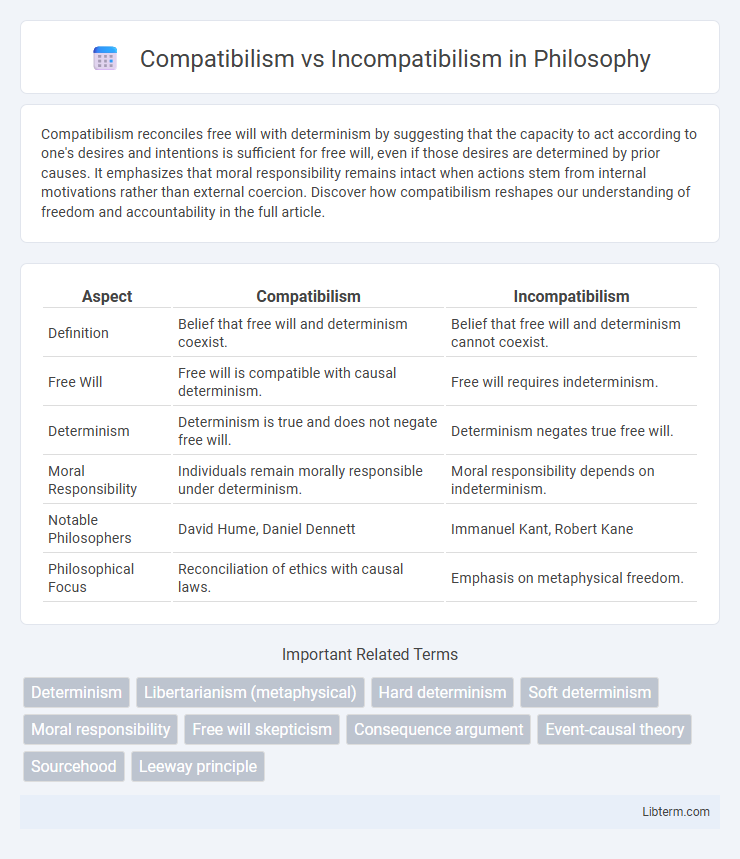Compatibilism reconciles free will with determinism by suggesting that the capacity to act according to one's desires and intentions is sufficient for free will, even if those desires are determined by prior causes. It emphasizes that moral responsibility remains intact when actions stem from internal motivations rather than external coercion. Discover how compatibilism reshapes our understanding of freedom and accountability in the full article.
Table of Comparison
| Aspect | Compatibilism | Incompatibilism |
|---|---|---|
| Definition | Belief that free will and determinism coexist. | Belief that free will and determinism cannot coexist. |
| Free Will | Free will is compatible with causal determinism. | Free will requires indeterminism. |
| Determinism | Determinism is true and does not negate free will. | Determinism negates true free will. |
| Moral Responsibility | Individuals remain morally responsible under determinism. | Moral responsibility depends on indeterminism. |
| Notable Philosophers | David Hume, Daniel Dennett | Immanuel Kant, Robert Kane |
| Philosophical Focus | Reconciliation of ethics with causal laws. | Emphasis on metaphysical freedom. |
Introduction to Compatibilism and Incompatibilism
Compatibilism asserts that free will and determinism are compatible, suggesting individuals can be morally responsible even if their actions are predetermined. Incompatibilism argues that free will cannot coexist with determinism, positing that if determinism is true, genuine freedom and moral accountability are impossible. These contrasting views form the foundation of ongoing debates in philosophy of free will, influencing ethical theory and metaphysics.
Defining Free Will: Core Concepts
Compatibilism defines free will as the ability to act according to one's desires and motivations without external coercion, emphasizing internal psychological freedom rather than absolute independence from causality. Incompatibilism argues that free will cannot exist if determinism is true, meaning that every event, including human actions, is causally predetermined and thus undermines moral responsibility. Core concepts of free will involve the tension between determinism, moral responsibility, and autonomy in decision-making processes.
The Historical Background of the Debate
The debate between Compatibilism and Incompatibilism dates back to early modern philosophy, with figures like Thomas Hobbes advocating for compatibilism by redefining free will as freedom from coercion, while incompatibilists like Immanuel Kant argued that true free will requires liberty that is incompatible with determinism. The 18th and 19th centuries saw significant contributions from philosophers such as David Hume, who offered a compatibilist account focusing on causal determinism and moral responsibility, contrasted with Arthur Schopenhauer's incompatibilist view emphasizing fatalism. This historical discourse laid the foundation for contemporary discussions on free will, moral responsibility, and the implications of determinism versus indeterminism.
Key Philosophers and Their Positions
Compatibilism, championed by philosophers like Daniel Dennett and Harry Frankfurt, asserts that free will is compatible with determinism by redefining freedom as acting according to one's desires without external coercion. Incompatibilists such as Peter van Inwagen and Robert Kane argue that free will cannot exist if determinism is true, emphasizing the necessity of indeterminism or alternative possibilities for moral responsibility. These divergent views shape ongoing debates in metaphysics and ethics regarding the nature of human agency and moral accountability.
Compatibilism: Freedom Within Determinism
Compatibilism asserts that free will is compatible with determinism, arguing that individuals can act freely even if their choices are predetermined by prior causes. It emphasizes that freedom consists in acting according to one's desires and intentions without external coercion, rather than the absence of causal determinism. Key philosophers such as David Hume and Daniel Dennett support this view, highlighting that moral responsibility remains intact within a deterministic framework.
Incompatibilism: The Challenge of Determinism
Incompatibilism asserts that free will and determinism cannot coexist, positing that if determinism is true, individuals lack genuine free choice. This perspective highlights the challenge that predetermined events pose to moral responsibility and personal autonomy. Philosophers like Peter van Inwagen emphasize that accepting determinism necessitates reevaluating traditional concepts of freedom and accountability.
Major Arguments for Compatibilism
Compatibilism argues that free will and determinism are compatible because individuals can act freely when their actions align with their desires and intentions, even if those desires are causally determined. Major arguments include the emphasis on the capacity for rational reflection and self-control as key components of moral responsibility. Compatibilists highlight that freedom is defined by the absence of external coercion rather than the absence of causal determinism.
Major Arguments for Incompatibilism
Incompatibilism argues that free will and determinism cannot coexist because determinism implies that every action is causally predetermined, eliminating genuine choice. Major arguments include the consequence argument, which states that if determinism is true, individuals have no control over the consequences of past events, thus no moral responsibility. Another key argument is the principle of alternate possibilities, asserting that free will requires the ability to have acted differently, which determinism negates.
Implications for Moral Responsibility
Compatibilism asserts that free will and determinism coexist, allowing individuals to be morally responsible even in a determined universe by emphasizing internal motivations and rational capacities. Incompatibilism argues that determinism negates genuine free will, thus undermining true moral responsibility since actions are preordained and not freely chosen. The debate impacts legal and ethical frameworks by influencing how accountability, blame, and praise are assigned in contexts where determinism is considered plausible.
Contemporary Perspectives and Ongoing Debates
Contemporary perspectives on compatibilism emphasize the reconciliation of free will with determinism by redefining freedom as the capacity to act according to one's desires without external coercion, a stance supported by philosophers like Daniel Dennett. Incompatibilism maintains that free will and determinism cannot coexist, with recent debates focusing on the implications of quantum mechanics and neuroscientific findings on moral responsibility and autonomy. Ongoing discussions explore the viability of libertarian free will versus deterministic frameworks, highlighting the evolving intersection of metaphysics, cognitive science, and ethics in understanding human agency.
Compatibilism Infographic

 libterm.com
libterm.com